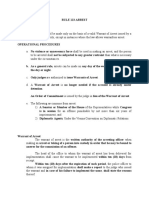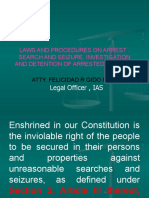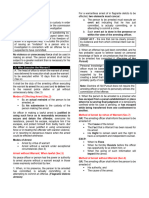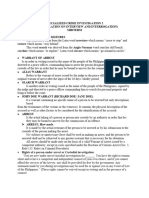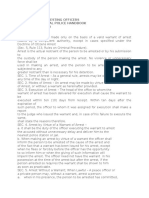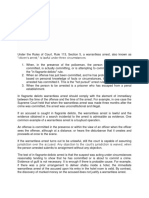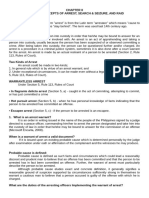0 ratings0% found this document useful (0 votes)
10 viewsChapter V Arrest
Chapter V Arrest
Uploaded by
Brandon DangatagArrest
Copyright:
© All Rights Reserved
Available Formats
Download as DOCX, PDF, TXT or read online from Scribd
Chapter V Arrest
Chapter V Arrest
Uploaded by
Brandon Dangatag0 ratings0% found this document useful (0 votes)
10 views4 pagesArrest
Original Title
Chapter v Arrest
Copyright
© © All Rights Reserved
Available Formats
DOCX, PDF, TXT or read online from Scribd
Share this document
Did you find this document useful?
Is this content inappropriate?
Arrest
Copyright:
© All Rights Reserved
Available Formats
Download as DOCX, PDF, TXT or read online from Scribd
Download as docx, pdf, or txt
0 ratings0% found this document useful (0 votes)
10 views4 pagesChapter V Arrest
Chapter V Arrest
Uploaded by
Brandon DangatagArrest
Copyright:
© All Rights Reserved
Available Formats
Download as DOCX, PDF, TXT or read online from Scribd
Download as docx, pdf, or txt
You are on page 1of 4
CHAPTER V
ARREST (RULE 113)
I. Arrest; How made:
Arrest is the taking of a person into custody in order that he may
be bound to answer for the commission of an offense.
Under the RULES OF COURT, an arrest is made by:
a. an actual restraint of a person to be arrested; or
b. a submission to the custody of the person making the arrest already
constitutes an arrest.
NOTE: No violence or unnecessary force shall be used in making an
arrest. The person arrested shall not be subject to greater restraint than is
necessary for his detention.
II. Duty of the arresting officer.
It shall be the duty of the officer executing the warrant to arrest the
accused and deliver him to the nearest police station or jail without necessary
delay.
Reason:
The officer may held liable under Article 125 of the Revised Penal
Code for the crime of Delay in the Delivery of Detained Persons to
Proper Judicial Authorities.
III. Execution of warrant.
The head of the office to whom the warrant of arrest was delivered for
execution shall cause the warrant to be executed within 10 days from its
receipt. Within 10 days after the expiration of the period, the officer to whom
it was assigned for execution shall make a report to the judge who issued the
warrant. In case of his failure to execute the warrant, he shall state the
reasons therefor.
IV. Exceptions to requirement of a warrant of arrest (Arrest without
warrant).
A peace officer or private person may, without warrant, arrest a
person:
a. When, in his presence, the person to be arrested has committed, is
actually committing, or is attempting to commit an offense;
b. When an offense has just been committed and he has probable cause
to believe that based on personal knowledge of facts or circumstances that the
person to be arrested has committed it; (Hot pursuit) and
c. When the person to be arrested is a prisoner who has escaped from a
pernal establishment or place where he is serving final judgement or is
temporarily confined while his case is pending, or has escaped while being
transferred from one confinement to another.
In cases falling under paragraph (a) and (b) above, the person arrested
without a warrant shall be forthwith delivered to the nearest police station or
jail and shall be proceeded against in accordance with Section 6 of RULE 112.
NOTE: Personal knowledge under the hot pursuit exception does not
refer to actual knowledge of the crime because the officer did not witness its
commission. The knowledge referred to is knowledge that a crime was
committed even if it was not committed in his presence.
V. Time of making arrest.
An arrest may be made on any day and at any time of the day or
night.
VI. Method of arrest by officer by virtue of warrant
When making an arrest by virtue of a warrant, the officer shall inform
the person to be arrested of the (a) cause of the arrest and (b) the fact that
a warrant has been issued for his arrest, except: (1) when he flees or (2)
forcibly resists before the officer has opportunity to so inform him, or (3)
when giving such information will imperil the arrest.
NOTE: The officer need not have the warrant in his possession at the
time of the arrest but after the arrest, if the person arrested so requires,
the warrant shall be shown to him as soon a practicable.
VII. Method of arrest by officer without warrant.
When making an arrest without a warrant, the officer shall: (a) inform
the person to be arrested of his authority and (b) the cause of the arrest,
unless: (1) the latter is either engaged in the commission of an offense, is
pursued immediately after its commission, (2) has escaped, (3) flees, or (4)
forcibly resists before the officer has opportunity to so inform him, or (5)
when giving such information will imperil the arrest.
VIII. Method of arrest by a private person.
When making an arrest, the private person shall (a) inform the person
to be arrested of his intention to arrest him and (b) the cause of the
arrest, unless (1) the latter is either engaged in the commission of an offense,
is pursued immediately after its commission, or (2) has escaped, (3) flees, or
(4) forcibly resists before the person making the arrest has opportunity to so
inform him, or (5) when giving such information will imperil the arrest.
IX. Officer may summon assistance.
An officer making a lawful arrest may orally summon as many persons
as he deems necessary to assist him in affecting the arrest. Every person so
summoned by an officer shall assist him in affecting the arrest when he can
render such assistance without detriment to himself.
X. Right of officer to break into building or enclosure.
An officer, in order to make an arrest either by virtue of a warrant, or
without a warrant, may break into any building or enclosure where the
person to arrest is or is reasonably believed to be, if he is refused
admittance thereto, after announcing his authority and purpose.
XI. Right to break out from the building or enclosure.
Whenever an officer has entered the building or enclosure, he may
break out therefrom when necessary to liberate himself.
XII. Arrest after escape or rescue.
If a person lawfully arrested escapes or is rescued, any person may
immediately pursue or retake him without a warrant at any time and in any
place within the Philippines.
XIII. Right to attorney or relative to visit person arrested.
Any member of the Philippine Bar shall, at the request of the person
arrested or of another acting in his behalf, have the right to visit and confer
privately with such person in the jail or any other place of custody at any hour
of the day or, of the night. Subject to reasonable regulations, a relative of the
person arrested can also exercise the same right.
Rights of the person arrested:
o The right to be assisted by counsel at all times;
o The right to remain silent;
o The right to be informed of the above rights; and
o The right to be visited by any immediate members of his
family, by his counsel, or by any non-governmental
organization, national or international.
NOTE: A person lawfully arrested may be searched, without a search warrant,
for dangerous weapons or anything which may be have been used or
constitute proof in the commission of the offense.
XIV. Effect of an illegal arrest on jurisdiction of the court.
The legality of the arrest affects only the jurisdiction of the court over
the person of the accused. The illegality of the arrest cannot in itself be the
basis for acquittal. It will not negate the validity of the conviction of the
accused.
The illegality of a warrantless arrest cannot deprive the State of its right
to prosecute the guilty when all other facts on record point to their culpability.
Indeed, the illegal arrest of the accused is not sufficient cause for setting aside
a valid judgement rendered upon a sufficient complaint after a trial free from
error.
XV. Waiver of illegality of arrest.
Any objection involving a warrant of arrest or the procedure by which
the court acquired jurisdiction of the person of the accused must be made
before he enters his plea; otherwise, the objection is deemed waived.
However, the principle that the accused is precluded after the
arraignment from questioning the illegal arrest applies only if the accused
voluntarily enters his plea and participates during the trial, without
previously invoking his objections thereto.
NOTE: When an accused fails to make a timely objection to an illegal
arrest, only the right to assail the arrest is waived. He does not waive the right
to question the admissibility of the evidence seized by virtue of the illegal
arrest.
In other words, the waiver of an illegal warrantless arrest does not
mean a waiver of the inadmissibility of evidence seized during an illegal
warrantless arrest.
XVI. Persons not subject to arrest.
a. Section 11, Article VI of the 1987 Constitution provides:
“A senator or member of the House of Representatives shall,
in all offenses punishable by not more than six (6) years of imprisonment, be
privileged from arrest while the Congress is in session.”
b. Under generally accepted principle of international law, the following
are immune from the criminal jurisdiction of the country of their assignment
and are, therefore, immune from arrest:
1. Sovereigns and other chief of states;
2. Ambassadors;
3. Ministers plenipotentiary;
4. Ministers resident; and
5. Charge d’affaires.
You might also like
- Jonathan Bolton - Worlds of Dissent - Charter 77, The Plastic People of The Universe, and Czech Culture Under Communism-Harvard University Press (2012) PDFDocument360 pagesJonathan Bolton - Worlds of Dissent - Charter 77, The Plastic People of The Universe, and Czech Culture Under Communism-Harvard University Press (2012) PDFHo Ta100% (1)
- CDI 3 - Specialized Crime Investigation 2 With Simulation On Interrogation and Interview FilesDocument93 pagesCDI 3 - Specialized Crime Investigation 2 With Simulation On Interrogation and Interview FilesDJ Free Music100% (6)
- PRIL Text Chapter 4 PDFDocument43 pagesPRIL Text Chapter 4 PDFShavi Walters-SkeelNo ratings yet
- Theories of Criminology PDFDocument58 pagesTheories of Criminology PDFHarshita Rathore75% (4)
- Finals Lecture Notes For Lea 4Document18 pagesFinals Lecture Notes For Lea 4bermejoalbert90No ratings yet
- Arrest Search and Siezure From LS HQDocument97 pagesArrest Search and Siezure From LS HQdawa batnagNo ratings yet
- Crimap - ReviewerDocument26 pagesCrimap - ReviewerBims CabsNo ratings yet
- Arrest Search and Siezure1Document97 pagesArrest Search and Siezure1Twinkle TwinxNo ratings yet
- Rule 113 ArrestDocument5 pagesRule 113 Arrestjanro jhon casipitNo ratings yet
- M4 Arrest Search and Seizure 2Document41 pagesM4 Arrest Search and Seizure 22z5fvtb2dzNo ratings yet
- Knowledge Is Power: Atty. Behn Joseph O Tesiorna LecturerDocument38 pagesKnowledge Is Power: Atty. Behn Joseph O Tesiorna LecturerSparks ManNo ratings yet
- Alized Crime Investigation 1 With Legal Med. Chapter 7 8Document80 pagesAlized Crime Investigation 1 With Legal Med. Chapter 7 8abrilladeborahNo ratings yet
- RULE 113 - CrimProDocument3 pagesRULE 113 - CrimProKim Loue FloroNo ratings yet
- CDI 3, 1st Exam CoverageDocument16 pagesCDI 3, 1st Exam CoverageEspionageNo ratings yet
- Module 2Document10 pagesModule 2valiantjob12No ratings yet
- RULE 113 - ArrestDocument4 pagesRULE 113 - Arrestjohn nestor cabus100% (1)
- 20.1. Laws and Procedures On Arrest, Search and Seisure, Investigation and Detention of Arrested PersonDocument93 pages20.1. Laws and Procedures On Arrest, Search and Seisure, Investigation and Detention of Arrested PersonGideon Tangan Ines Jr.No ratings yet
- CHAPTER V Part1 INTRODUCTION TO PHILIPPINE CRIMINAL JUSTICE SYSTEMDocument5 pagesCHAPTER V Part1 INTRODUCTION TO PHILIPPINE CRIMINAL JUSTICE SYSTEMdalminorowelenNo ratings yet
- ItpDocument65 pagesItpWen AdenzNo ratings yet
- LEA32Document11 pagesLEA32zv4mv5bhrbNo ratings yet
- Rule 113 115 ReviewDocument8 pagesRule 113 115 ReviewIZZA GARMANo ratings yet
- Lecture Arrest, Seizure EtcDocument58 pagesLecture Arrest, Seizure EtcSparks ManNo ratings yet
- Cdi 3 MidtermDocument17 pagesCdi 3 MidtermJohnpaul AlegadoNo ratings yet
- SEP 29 2020 Crim Pro: Actual Restraint of A Person SubmissionDocument5 pagesSEP 29 2020 Crim Pro: Actual Restraint of A Person SubmissionChristian Rize NavasNo ratings yet
- Report (Best of Luck!)Document22 pagesReport (Best of Luck!)Jas OcampoNo ratings yet
- Presentation 5Document25 pagesPresentation 5007bond007bondjamesNo ratings yet
- Arrest Without Warrant When LawfulDocument2 pagesArrest Without Warrant When LawfulStephanie SerapioNo ratings yet
- Rule 113 ArrestDocument3 pagesRule 113 ArrestkakashikabutoNo ratings yet
- Notes On Arrest (Rule 113)Document8 pagesNotes On Arrest (Rule 113)Reynaldo SamanteNo ratings yet
- Chapter 116Document26 pagesChapter 116Rukundo JuliusNo ratings yet
- Rule 113 Arrest and Rule 114 BailDocument7 pagesRule 113 Arrest and Rule 114 BailEmil BautistaNo ratings yet
- Duties of The Arresting OfficersDocument3 pagesDuties of The Arresting OfficersJuveren Jonald Bowat Mendoza100% (1)
- Right Against Unreasonable Searches and Seizures 0Document5 pagesRight Against Unreasonable Searches and Seizures 0Johnrein RosalesNo ratings yet
- Revised Rules 113Document3 pagesRevised Rules 113Rica BanielNo ratings yet
- Crimpro Midterms CodalDocument5 pagesCrimpro Midterms CodalJerome MoradaNo ratings yet
- Notes in Correction 2015Document68 pagesNotes in Correction 2015criminologyalliance100% (1)
- Lea 4Document53 pagesLea 4Anna Marie Ventayen Miranda100% (1)
- PH Basic Criminal Procedures (Arrest)Document77 pagesPH Basic Criminal Procedures (Arrest)atornijoseNo ratings yet
- Arrest and Search PDFDocument9 pagesArrest and Search PDFLopez Marc JaysonNo ratings yet
- criminal procedure code actDocument25 pagescriminal procedure code actkleakdigitalsystemsNo ratings yet
- Juancito, Freddie JR., M. BS-Criminology 4A / OJT OutputDocument19 pagesJuancito, Freddie JR., M. BS-Criminology 4A / OJT OutputSANDY ANGENETTE A. CATBAGANNo ratings yet
- Arrest Rule 113Document5 pagesArrest Rule 113Anonymous OwPve08xPNo ratings yet
- Specialized Crime With Interview Part2Document6 pagesSpecialized Crime With Interview Part2Joven Gerald ObanilNo ratings yet
- ARRESTDocument12 pagesARRESTJohn lester RavasNo ratings yet
- Law Enforcement Operations and Planning With Crime MappingDocument12 pagesLaw Enforcement Operations and Planning With Crime MappingAirah Dela Rita TilapNo ratings yet
- Crim Proc LectureDocument40 pagesCrim Proc LectureFil Libres IlaganNo ratings yet
- Arrest and Search ReportDocument17 pagesArrest and Search ReportLopez Marc JaysonNo ratings yet
- Chapter 2Document14 pagesChapter 2Leyla Gitac CenizaNo ratings yet
- Chapter-2-cdi (1)Document9 pagesChapter-2-cdi (1)ivanreycabatingan01No ratings yet
- MODULE8-FII (1)Document7 pagesMODULE8-FII (1)solonpena94No ratings yet
- New Arrest, Search and SeizuresDocument64 pagesNew Arrest, Search and SeizuressahintatagNo ratings yet
- Rule 113 - Arrest by TiuDocument19 pagesRule 113 - Arrest by Tiukateangela.sauraNo ratings yet
- Arrest: Revised Rules of Criminal ProcedureDocument2 pagesArrest: Revised Rules of Criminal ProcedureKent John Dela SaldeNo ratings yet
- Chapter 8 Basic Criminal ProcedureDocument28 pagesChapter 8 Basic Criminal ProcedureMark AlzagaNo ratings yet
- Read Rules 113 and 126, Revised Rules of CourtDocument3 pagesRead Rules 113 and 126, Revised Rules of CourtDayday AbleNo ratings yet
- Law Enforcement Operations and Planning With Crime Mapping Unit 2Document7 pagesLaw Enforcement Operations and Planning With Crime Mapping Unit 2dominiqueNo ratings yet
- Crim Proc LectureDocument40 pagesCrim Proc LectureJb PabilicNo ratings yet
- All ReportsDocument30 pagesAll Reportssyvictoria65No ratings yet
- New CurriculumDocument2 pagesNew CurriculumBrandon DangatagNo ratings yet
- 2023 Legal Opinion MOA With LCDFIDocument1 page2023 Legal Opinion MOA With LCDFIBrandon DangatagNo ratings yet
- CJE 115 Criminal Procedure BSCRIM 4Document2 pagesCJE 115 Criminal Procedure BSCRIM 4Brandon DangatagNo ratings yet
- CONFLICT OF LAWS Case DigestDocument2 pagesCONFLICT OF LAWS Case DigestBrandon DangatagNo ratings yet
- Affidavit of Consent Kub-AronDocument1 pageAffidavit of Consent Kub-AronBrandon DangatagNo ratings yet
- Affidavit of Legitimation TabbangDocument2 pagesAffidavit of Legitimation TabbangBrandon DangatagNo ratings yet
- Aff Complaint DILGDocument4 pagesAff Complaint DILGBrandon DangatagNo ratings yet
- Acknowledgment Receipt BalaisDocument1 pageAcknowledgment Receipt BalaisBrandon DangatagNo ratings yet
- Aff-Change of Business Name 1Document2 pagesAff-Change of Business Name 1Brandon DangatagNo ratings yet
- Affidavit-Vendor Aggregate LH Ga-AyonDocument1 pageAffidavit-Vendor Aggregate LH Ga-AyonBrandon DangatagNo ratings yet
- Crim Pro Chapter II Prosecution of OffensesDocument4 pagesCrim Pro Chapter II Prosecution of OffensesBrandon DangatagNo ratings yet
- No Right To Conceal A Firearm, 10th Cir. RulesDocument52 pagesNo Right To Conceal A Firearm, 10th Cir. RulesFindLawNo ratings yet
- MC 2016-002Document37 pagesMC 2016-002Se Leen100% (1)
- Certificate of Candidacy Club LevelDocument2 pagesCertificate of Candidacy Club Levelfernandezroneljoy1100% (1)
- Whaley V WatsonDocument2 pagesWhaley V WatsonEmily Hancox0% (1)
- Unfair DismissalDocument2 pagesUnfair DismissaltiffanyNo ratings yet
- N L U O S VI: Ational AW Niversity Disha EmesterDocument17 pagesN L U O S VI: Ational AW Niversity Disha Emesterbipin puniaNo ratings yet
- UPSC Mains PYQ Missing Themes SampleDocument1 pageUPSC Mains PYQ Missing Themes Samplehewhoremains108No ratings yet
- q3m1l4 Kontrasabenevolentassimilation 130919191209 Phpapp02Document27 pagesq3m1l4 Kontrasabenevolentassimilation 130919191209 Phpapp02Honiel Pagobo100% (1)
- Tyson Super Concrete Vs CA. GR 140081, June 23,2005 PDFDocument20 pagesTyson Super Concrete Vs CA. GR 140081, June 23,2005 PDFPierreNo ratings yet
- Family Courts in BangladeshDocument46 pagesFamily Courts in Bangladeshzahid_biswas5217100% (9)
- Ques 1Document15 pagesQues 1Monisha ChaturvediNo ratings yet
- Essential Vocabulary From The AP European History Key ConceptsDocument8 pagesEssential Vocabulary From The AP European History Key Conceptsise eggfNo ratings yet
- ProiectDocument273 pagesProiectjucan paulinaNo ratings yet
- WhyWhy Feminism Is ObsoleteDocument2 pagesWhyWhy Feminism Is ObsoleteLukas E Koube0% (1)
- IdahoDocument8 pagesIdahobrianstryfeNo ratings yet
- Binder Commercial AffidavitDocument100 pagesBinder Commercial Affidavitanon_49276No ratings yet
- 3.2 State Patronage and Local ElitesDocument4 pages3.2 State Patronage and Local Elites크리스틴No ratings yet
- #18 Riera V PalmaroliDocument2 pages#18 Riera V PalmaroliCJ Romano100% (1)
- People v. BautistaDocument2 pagesPeople v. BautistarethiramNo ratings yet
- G.R. No. L-9692Document10 pagesG.R. No. L-9692mar corNo ratings yet
- 9 The Aims of Punishment and Principles of SentencingDocument14 pages9 The Aims of Punishment and Principles of Sentencingiskandar027No ratings yet
- Radical: Iiumantsi/ (M. ROY KDocument11 pagesRadical: Iiumantsi/ (M. ROY KMd FahimNo ratings yet
- Booklet 11 General Rules of ProcedureDocument7 pagesBooklet 11 General Rules of ProcedureLucia CarabelliNo ratings yet
- G.R. No. 159411Document5 pagesG.R. No. 159411Philip Cesar EstreraNo ratings yet
- People of The Philippines vs. Darwin Bernabe y GarciaDocument3 pagesPeople of The Philippines vs. Darwin Bernabe y GarciaLemlouie ClasseNo ratings yet
- TCW Midterm ExamDocument2 pagesTCW Midterm ExamJohn kevin AbarquezNo ratings yet
- Mixed Economy 1Document7 pagesMixed Economy 1sanju balanavarNo ratings yet









